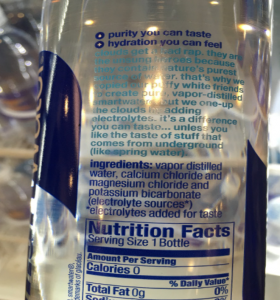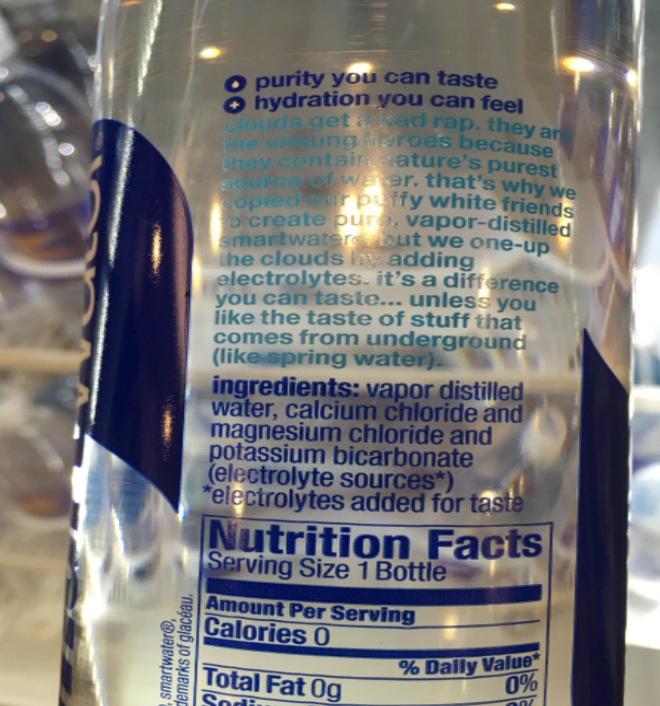By Alecia Sexton
Layout Manager
Electrolytes are the body’s key to energy production, cardiac function, water balance and movement. They do this by communicating with one another and with the rest of the body, to maintain a normal blood pressure, ensure that there’s the proper amount of fluid cushioning our bones and to regulate electric signals that enable smooth muscles (such as the heart and intestinal system) to relax and contract normally.

“Smart Water” sold at Hillwood Commons listing added electrolytes
Electrolyte concentration is controlled by two major systems, the kidneys and the adrenal glands. These systems release hormones that signal electrolyte excretion, movement and reabsorption throughout the body. There are four important electrolytes that are essential to keep the body functioning; they are sodium, potassium, magnesium and calcium. Sodium plays a crucial role in water balance since wherever it goes, water follows. Sodium is essential for proper heart, muscle and brain function, but here in America, due to a high reliance on processed fast foods with low quality salt, these beneficial effects are compromised. A high intake of this low quality salt causes the condition hypernatremia (high sodium), which has largely affected the American public. Large amounts of this low quality sodium causes high blood pressure and strains the heart, increasing the risk of cardiac episodes. Steering clear of traditional table salt (sodium chloride) and using more mineral dense sea salt can help rectify this problem.
Another vital electrolyte is potassium. Its primary duties are smoothing muscle contraction and controlling the electrical activity of the heart. Along with sodium, it’s extremely important to replenish your potassium after strenuous physical exercise (these two electrolytes are the rst to be lost through sweating). Some great sources of potassium are citrus fruits, potatoes and nuts.
It’s been known for centuries that calcium causes strong teeth and bones, but what we may not realize is our body’s calcium concentration plays a vital role in the release of certain hormones such as calcitonin and parathyroid hormone. Calcitonin, released by the thyroid gland, stimulates bones to absorb calcium, decreasing calcium concentration in your blood. Parathyroid hormone, released by the parathyroid glands, does the opposite. Calcium is also responsible for muscle contraction and interneuron communication. Some common sources of this mineral include dark, leafy green vegetables and dairy.
Magnesium in charge of stress management and muscle relaxation, but a sufficient level of it in the body is required for the proper allocation of all other electrolytes. Without enough magnesium, it’s impossible to rectify a potassium deficiency and it’s a lot harder to properly absorb calcium and avoid calcification of the arteries. Magnesium is an enzyme cofactor, meaning that in order for proper digestion and ATP (the body’s form of energy) synthesis, enough magnesium must be present. Some common sources of magnesium include dark chocolate, nuts, and seeds.
Electrolytes are important, but be sure to vary things up a bit. Consume enough water, and indulge in a colorful diet with lots of fresh foods. This is the best way to ensure you replenish yourself and your electrolyte losses.




Be First to Comment